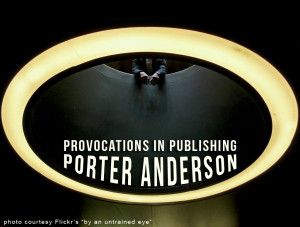The Tension of the Times
By Porter Anderson (@Porter_Anderson) | December 20, 2019 |
‘Reinventing You’
On December 4, Don Maass’ first of a planned three columns on this year’s Writer Unboxed Un-Con helped me sort out one of the more interesting tensions I’ve seen growing this year in the writing community at its broadest. It involves risk, going wide, and who does it.
I’m using tension here in its safer connotation(s), as in a helpful tautness that keeps a tightrope walker from falling, or, as one dictionary treatment has it, “inner unrest, striving, or imbalance.” Years’ ends are good moments to assess tensions of many kinds, because the psychological transfer of one year to another itself vibrates with tension, energy–captured at best and lashing around at worst.
That old phrase “to catch the tenor of the times” today makes more sense as “to catch the tension of the times.”
Don writes, “Every manuscript holds back in some way,” and he goes on to list ways that a work’s own dynamics can defeat itself, including “Characters who only go so deep”–which I originally read as “characters who only go to sleep,” ironically–as well as “outcomes never really in doubt” and “voices that could be anyone’s.”
He goes on to describe a capacity for “reinventing you,” which can create a “sense of wonder we feel in reading [something that] springs from what is personal to you in writing.” And he captures the value of being terrified. “Terrified is exactly how you want to be. When you’re terrified, you’re not playing it safe.”
I realized where I’d seen this first: tennis. In 2012, the Czech tennis player Lukáš Rosol defeated Rafael Nadal in the second round at Wimbledon. The tennis world was aghast. Rosol was a virtual unknown, a kid. He’d blasted into view on a grass court and he’d taken down the No. 2 player in the world at one of the highest peaks of the sport, the All England Club.
In ensuing years, the incident would be repeated with more recognition. Every now and then, a player–usually young, usually far down in the world rankings–will take out a star of the pantheon in an early match at a big tournament. It happens with enough frequency that wary eyes look at early draws now to see where these moments might occur.
And at one point, Serena Williams articulated exactly what’s happening. The more mature, vaunted players–herself included–can be blindsided by such an opponent, she said, because the comparative newcomer has nothing to lose. Just to get onto one of the great courts of the tournament year with one of the legends of the game is such a break that a player in this position will risk everything. While the more seasoned champion is pacing her- or himself for the incredible strain of a two-week tournament, the “out of nowhere” player will spend every ounce of strength he or she has to win this potentially career-igniting match.
And this year’s writerly observers are seeing something that carries a rough parallel to this. It’s my provocation for you today.
Write Like Rosol

Provocations graphic by Liam Walsh
I’ve mentioned here before the huge reading and writing platform Wattpad. Stay with me. I’m not going to tell you to run away to the Wattpad circus, but there’s tension here for us to learn from.
Based in Toronto, the system now has more than 80 million active users monthly. They’re in just about every country the UN recognizes. They’re working in more than 50 languages on the platform.
And the corporate hub of Wattpad created by Allan Lau and Ivan Yuen in 2016 opened an arm of the company called Wattpad Studios. With Aron Levitz and Eric Lehrman at the helm of the studios division, the company now has production deals for film and television in Europe and Asia. This year, a new subsidiary, Wattpad Books, was also introduced by Ashleigh Gardner. While the platform continues to make deals with major publishers in many parts of the world, Wattpad Books is capturing some of the biggest hits from the system, itself, and publishing them in fully edited editions.
The caveats going up in your mind are fully valid. Yes, this is user-generated content, most of it created by young people for young people. It exists in a parallel universe, making contact with the mainstream when a big film that started as a Wattpad story is released or when one of the major houses publishes a book with millions of fans ready to buy it because it first appeared as a seat-of-somebody’s-pants serial on the Internet.
But what I keep saying to executives at Wattpad is that I’d love to see an “adult version” of Wattpad. Not a platform on which Margaret Atwood does a zombie series on for the novelty of it all (she did that at Wattpad) but a place in which writers of experience and training–even using pseudonyms, as the Wattpadders do–could test out material in the rapid-response, hot-touch environment of that online system.
The company tells me that what I want is already there. And it’s true that there are some writers of a certain age operating on the platform. I know one, Tamara Lush. She was formerly a journalist-colleague of mine, an Associated Press reporter with a terrific career. The “fun writing” she’d been developing as a sideline for years matches the taste of many on the platform and she’s now one of the leading writers in the specialized paid-for sector of the platform, and more power to her.
But for the most part, the writers of the international Wattpad community, largely aged primarily between 13 and 34, are “out of nowhere” players with the potential to win on Hollywood’s court. They terrify themselves by making bold choices, surprising their legions of serial readers. Boy, do they need editing, sure. But once the system surfaces their stories, Wattpad’s deal with Sony Pictures or Mediaset or Bavaria Fiction or another major entertainment player can put them right onto your and my screens.
The Tension of the Times
The potentially healthy tension, then, for us here at Writer Unboxed is something beyond mainstream storytelling and user-generated work. It’s a tension between mainstream storytelling and user-enabled work.
A vast, clamoring population of writers is pouring into its work what Don calls “your fear, your longing, your wounded heart, your passionate beliefs, your unquenchable hope.” And they respond to what Therese asked Don to address–what to do when your career crashes and burns–with phoenix-like fury, hammering story installments into place on a tight schedule to keep those fans reading. They know the discipline. But they also know risks, and they take them.
I’d recommend we not think of these writers as competition. Think of them as examples, as people whose circumstances and creativity allow them to, as Don was writing, “be fierce, be dangerous, mean the utmost, cut deep, desire everything, hope for the impossible—then bring it about.”
Your career as a writer, your path to publication, is your own. It’s right, it’s correct for you. I’m not asking you to change a thing. But I’m recommending you look at how differently those writers operate in the context of their work. We might call it reckless. But I think Don is warning us that we’d do well to look for what feels reckless in ourselves, to reinvent ourselves, as he puts it.
What’s your thinking on this? How able are you to “terrify yourself with the worst things and delight yourself with words,” as Don so succinctly wrote? Could you free up better if you were in an environment in which you owed your readers only a chapter at a time and had the benefit of their cheers without exposure to the mainstream industry’s blogger-community-wags? In short, could mainstream writers benefit from the enabling freedom of a Wattpad cyber-sandbox to try out “your fear, your longing, your wounded heart” in?
Update: This column initially went out with a bit of bad coding and such, as we encountered some technical issues with the CMS. Big thanks to Vaughn Roycroft for getting things back on track!
And I wish you a happy new year of risk-taking in 2020.
[coffee title=”Wish you could buy Porter a glass of Campari?” icon=”glass”]Now, thanks to tinyCoffee and PayPal, you can![/coffee]










Hi Porter, I’ll take one major point from your piece, which always challenges us and covers a lot of ground. There’s a page in my novel that breaks some rules for Women’s Fiction, and so to see where it might go, I entered it in a contest run by women. If it goes into the dark, I won’t really know what “the readers” said. But I will know that I sent it into the world, and it’s never going to be deleted from its major place in my novel. Wishing you more ideas for the New Year.
Porter, thank you for this post.
“Poems, as criticism always has assured us, must give pleasure. But – despite the insistence of whole traditions of poetry and Romanticism in particular – poems are not given by pleasure, but by the unpleasure of a dangerous situation, the situation of anxiety of which the grief of influence forms so large a part.” (Harold Bloom, The Anxiety of Influence, pg 58)
I think the primary critical influence on writers is the anxiety of influence. We tend to call it fear, but it’s a more complicated emotion. In order to learn, we imitate, but to succeed we must produce a strong misreading of what came before us.
Do I fear the mainstream industry’s blogger-community-wags? No, I am anxious to overcome the grief of influence.
I did Wattpad for my debut novel (the first in a mainstream trilogy), and managed to put up a new, finished scene every two weeks for almost two years – after which I tweaked, formatted, and published on Amazon in ebook and print. (Note: I started with a backlog of 40 finished scenes, and squeaked by to get the last one, and had registered the copyright before I posted the last chapter’s scenes.)
Wattpad gave me other grownups to talk to. It gave me the great quotes I used for my marketing when I got started. It encouraged me – I still visit daily.
The prequel short story was a featured story. My friends there kept me going over the long hard slog of finishing.
I may do the same thing with the second volume of the trilogy once I’m sure I can fulfill the commitment – hate to promise and not deliver.
But I still feel the grownups are out in left field there. Those of us past retirement age are few.
And I was never looking for that much feedback, as I only posted scenes that were finished. It was more testing my own ability. Maybe that’s because I’m an extreme plotter. The ‘fear, longing, and wounded heart part’ were over before Wattpad saw a word.
I terrify myself continuously – but not in public. So I’m not using it ‘right.’
That novel is still there, as much as being in KU allows, and anyone who starts it there is welcome to request an ebook copy, but I get few takers.
Porter, thanks for this further exploration of how we might terrify ourselves. ;-)
I’ll add another tennis anecdote. The great Martina Navratilova, after a similar early loss to a very young rival, said that young people play with a recklessness that older players such as herself cannot indulge. She must play with a certain amount of caution, aware of her aging body and the possibility of injury. As a young player she had believed herself physically invulnerable.
Do I write now with caution? About time perhaps. I haven’t tried Wattpad but I have participated in a similar exercise (a MOOC) but found the comments were not substantive enough to be worth the time invested.